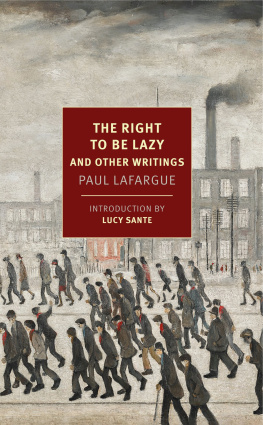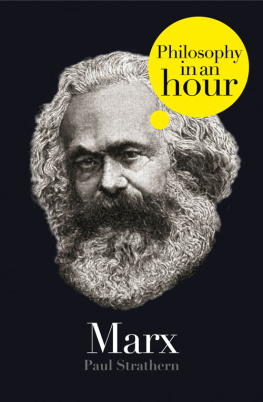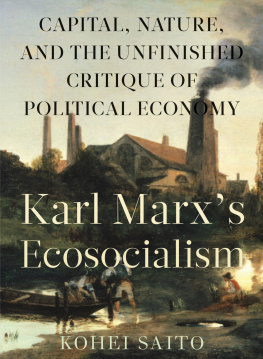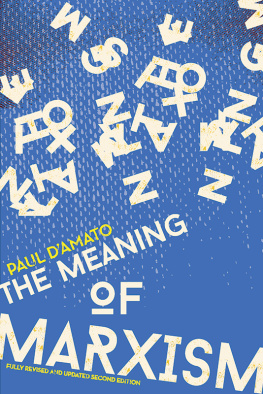THE RIGHT TO BE LAZY
* * *
PAUL LAFARGUE
Translated by
CHARLES KERR
*
The Right To Be Lazy
First published in 1883
ISBN 978-1-62013-009-4
Duke Classics
2012 Duke Classics and its licensors. All rights reserved.
While every effort has been used to ensure the accuracy and reliability of the information contained in this edition, Duke Classics does not assume liability or responsibility for any errors or omissions in this book. Duke Classics does not accept responsibility for loss suffered as a result of reliance upon the accuracy or currency of information contained in this book.
Contents
*
*
Let us be lazy in everything, except in loving and drinking, except in being lazy.
Gotthold Ephraim Lessing
Preface
*
M. Thiers, at a private session of the commission on primary education of 1849, said: "I wish to make the influence of the clergy all powerful because I count upon it to propagate that good philosophy which teaches man that he is here below to suffer, and not that other philosophy which on the contrary bids man to enjoy." M. Thiers was stating the ethics of the capitalist class, whose fierce egoism and narrow intelligence he incarnated.
The Bourgeoisie, when it was struggling against the nobility sustained by the clergy, hoisted the flag of free thought and atheism; but once triumphant, it changed its tone and manner and today it uses religion to support its economic and political supremacy. In the fifteenth and sixteenth centuries, it had joyfully taken up the pagan tradition and glorified the flesh and its passions, reproved by Christianity; in our days, gorged with goods and with pleasures, it denies the teachings of its thinkers like Rabelais and Diderot, and preaches abstinence to the wageworkers. Capitalist ethics, a pitiful parody on Christian ethics, strikes with its anathema the flesh of the laborer; its ideal is to reduce the producer to the smallest number of needs, to suppress his joys and his passions and to condemn him to play the part of a machine turning out work without respite and without thanks.
The revolutionary socialists must take up again the battle fought by the philosophers and pamphleteers of the bourgeoisie; they must march up to the assault of the ethics and the social theories of capitalism; they must demolish in the heads of the class which they call to action the prejudices sown in them by the ruling class; they must proclaim in the faces of the hypocrites of all ethical systems that the earth shall cease to be the vale of tears for the laborer; that in the communist society of the future, which we shall establish "peaceably if we may, forcibly if we must," the impulses of men will be given a free rein, for "all these impulses are by nature good, we have nothing to avoid but their misuse and their excesses," and they will not be avoided except by their mutual counter-balancing, by the harmonious development of the human organism, for as Dr. Beddoe says, "It is only when a race reaches its maximum of physical development, that it arrives at its highest point of energy and moral vigor." Such was also the opinion of the great naturalist Charles Darwin.
This refutation of the "Right to Work" which I am republishing with some additional notes appeared in the weekly Egalit, 1880, second series.
P.L.
Sainte-Plagie Prison, 1883.
Chapter I - A Disastrous Dogma
*
A strange delusion possesses the working classes of the nations where capitalist civilization holds its sway. This delusion drags in its train the individual and social woes which for two centuries have tortured sad humanity. This delusion is the love of work, the furious passion for work, pushed even to the exhaustion of the vital force of the individual and his progeny. Instead of opposing this mental aberration, the priests, the economists and the moralists have cast a sacred halo over work. Blind and finite men, they have wished to be wiser than their God; weak and contemptible men, they have presumed to rehabilitate what their God had cursed. I, who do not profess to be a Christian, an economist or a moralist, I appeal from their judgement to that of their God; from the preachings of their religious, economics or free thought ethics, to the frightful consequences of work in capitalist society.
In capitalist society work is the cause of all intellectual degeneracy, of all organic deformity. Compare the thorough-bred in Rothschilds stables, served by a retinue of bipeds, with the heavy brute of the Norman farms which plows the earth, carts the manure, hauls the crops. Look at the noble savage whom the missionaries of trade and the traders of religion have not yet corrupted with Christianity, syphilis and the dogma of work, and then look at our miserable slaves of machines.
When, in our civilized Europe, we would find a trace of the native beauty of man, we must go seek it in the nations where economic prejudices have not vet uprooted the hatred of work. Spain, which, alas, is degenerating, may still boast of possessing fewer factories than we have of prisons and barracks; but the artist rejoices in his admiration of the hardy Andalusian, brown as his native chestnuts, straight and flexible as a steel rod; and the heart leaps at hearing the beggar, superbly draped in his ragged capa, parleying on terms of equality with the duke of Ossuna. For the Spaniard, in whom the primitive animal has not been atrophied, work is the worst sort of slavery. The Greeks in their era of greatness had only contempt for work: their slaves alone were permitted to labor: the free man knew only exercises for the body and mind. And so it was in this era that men like Aristotle, Phidias, Aristophanes moved and breathed among the people; it was the time when a handful of heroes at Marathon crushed the hordes of Asia, soon to be subdued by Alexander. The philosophers of antiquity taught contempt for work, that degradation of the free man, the poets sang of idleness, that gift from the Gods:
O Melibae Deus nobis haec otia fecit.
Jesus, in his sermon on the Mount, preached idleness: "Consider the lilies of the field, how they grow: they toil not, neither do they spin: and yet I say unto you that even Solomon in all his glory was not arrayed like one of these." Jehovah the bearded and angry god, gave his worshipers the supreme example of ideal laziness; after six days of work, he rests for all eternity.
On the other hand, what are the races for which work is an organic necessity? The Auvergnians; the Scotch, those Auvergnians of the British Isles; the Galicians, those Auvergnians of Spain; the Pomeranians, those Auvergnians of Germany; the Chinese, those Auvergnians of Asia. In our society which are the classes that love work for works sake. The peasant proprietors, the little shopkeepers; the former bent double over their fields, the latter crouched in their shops, burrow like the mole in his subterranean passage and never stand up to look at nature leisurely.
And meanwhile the proletariat, the great class embracing all the producers of civilized nations, the class which in freeing itself will free humanity from servile toil and will make of the human animal a free being, the proletariat, betraying its instincts, despising its historic mission, has let itself be perverted by the dogma of work. Rude and terrible has been its punishment. All its individual and social woes are born of its passion for work.
Chapter II - Blessings of Work












